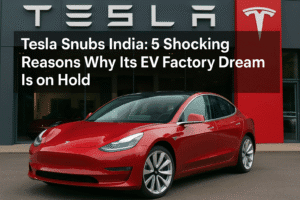Tesla Snubs India: 5 Shocking Reasons Why Its EV Factory Dream Is on Hold
Tesla has opted against manufacturing EVs in India despite government incentives, choosing instead to open two showrooms. Union Minister Kumaraswamy confirmed this stance while noting commitments from Mercedes-Benz, Volkswagen-Škoda, Hyundai, and Kia under India’s EV production scheme. Tesla’s hesitation reflects concerns over India’s still-developing premium EV market scale, supply chain readiness, and global demand challenges amid competition from BYD.
The decision contrasts with years of speculation about Tesla’s India factory and follows Elon Musk’s postponed investment visit. India’s policy offers reduced import duties in exchange for significant local manufacturing investment, which Tesla currently deems commercially premature. While other automakers validate India’s long-term potential, Tesla’s showroom-first approach signals cautious market testing rather than production commitment. This reality check underscores that India’s EV manufacturing ambitions require persistent ecosystem development beyond courting single players.

Tesla Snubs India: 5 Shocking Reasons Why Its EV Factory Dream Is on Hold
Union Minister H.D. Kumaraswamy’s blunt statement this week landed like a splash of cold water: Tesla, despite years of anticipation, is “not interested in manufacturing in India.” Instead, the EV pioneer is focusing on opening two showrooms. This revelation starkly contrasts with the enthusiastic interest shown by global giants like Mercedes-Benz, Volkswagen-Škoda, Hyundai, and Kia in India’s ambitious EV manufacturing scheme.
Beyond the Headlines: Decoding the Signals
This isn’t just about Tesla changing plans; it’s a window into the complex realities of India’s EV ambitions and Tesla’s global calculus:
- The “Why Not” for Tesla: While India’s policy offers reduced import duties (15%) on up to 8,000 high-value EVs annually in exchange for significant local investment (Rs 4,150 crore) and domestic value addition targets, Tesla’s hesitation likely stems from deeper concerns:
- Scale vs. Certainty: India’s passenger EV market, while growing rapidly, is still nascent compared to China, Europe, or the US. Committing billions to local manufacturing requires confidence in achieving the massive volume needed for profitability, especially for a company navigating global demand fluctuations and intense Chinese competition (like BYD).
- Supply Chain Realities: Building a reliable, cost-competitive EV supply chain in India is a monumental task still in progress. Tesla may be wary of the challenges and time required to establish or integrate into local component ecosystems meeting their standards.
- Strategic Focus: With global demand cooling and fierce competition heating up, Tesla may be prioritizing maximizing efficiency and cash flow in existing mega-factories (Berlin, Texas, Shanghai) over the risks and long gestation period of a new greenfield project in India. Showrooms test the market with minimal investment.
- The Significance of the “Yes” from Others: The active interest from Mercedes, VW-Skoda, Hyundai, and Kia validates the potential of India’s EV policy. These established players, already deeply invested in India’s auto market, see the scheme as a viable path to:
- Access premium Indian EV buyers with competitively priced imported models initially.
- Gradually build local manufacturing capacity in a market they believe will be crucial long-term.
- Meet stringent domestic value addition targets over time, aligning with ‘Make in India’.
- The Geopolitical Echo: Former US President Trump’s criticism of Tesla’s (and Apple’s) potential Indian expansion as “unfair” highlights the sensitive global trade environment. While the current US administration’s stance may differ, it underscores the political pressures global companies navigate when shifting manufacturing footprints.
- Tempering Expectations: The Global Trade Research Initiative (GTRI) rightly injects realism. Even for committed manufacturers, translating policy into showroom-ready, locally produced EVs will take years – likely not before 2027 or later. The immediate benefit for approved firms is the reduced-duty import window.
The Road Ahead: India’s EV Journey Continues
Tesla’s current stance is a significant data point, but not a verdict on India’s EV potential.
- For India: The focus must remain on building a robust, competitive domestic EV ecosystem – attracting diverse players (as seen with the other OEMs), fostering component innovation, and accelerating charging infrastructure. Success will depend on consistent policy execution and creating an environment where manufacturing makes undeniable economic sense, regardless of one company’s decision.
- For Tesla: The showrooms represent a cautious toe-dip. Their success, coupled with the growth of India’s premium EV market and the evolving supply chain, could eventually shift the calculus. However, for now, India remains a market to sell cars, not make them, for Elon Musk.
Kumaraswamy’s candid admission cuts through years of speculation and hype. It reveals a pragmatic understanding: India cannot hinge its entire EV manufacturing dream on a single, albeit iconic, player. True success lies in creating a vibrant, competitive ecosystem attractive to multiple global and domestic manufacturers. Tesla’s showrooms will test the market’s appetite for their brand, but the heavy lifting of building India’s electric future is being embraced by others ready to commit bricks and mortar. The race is on, with or without Tesla’s factory – for now.
You must be logged in to post a comment.